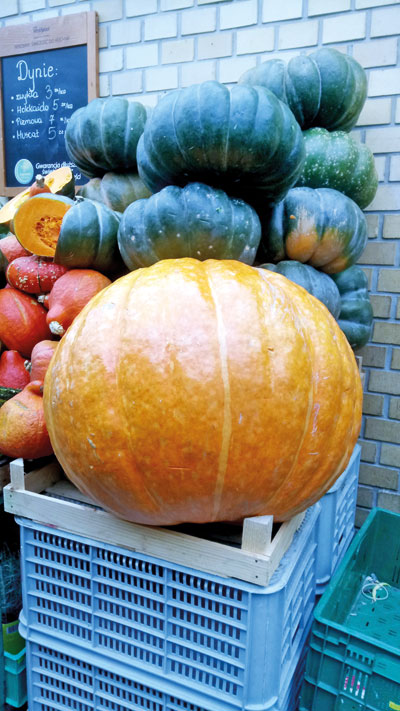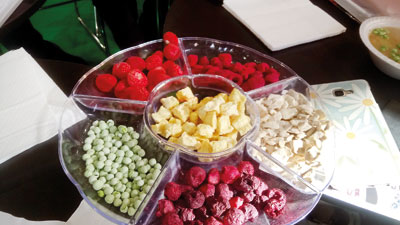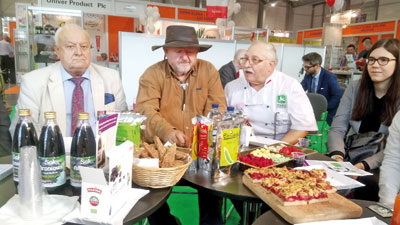Giant pumpkins and fresh food in Polish street markets
View(s):POZNAN, Poland – Strange encounters happen everywhere but what was so strange in meeting an Ukranian engineer and discussing South Asian history over a glass of beer in a pub? Well for starters it happened in Poznan, a large city outside Poland’s capital of Warsaw, where both of us were aliens.

Giant pum
The meeting was accidental. One evening, I was looking for a pub to sample some Polish beer and bumped into a man on the street, asking him for directions to the nearest pub. “Come I will show you,” he said, happily. Pelykh Bogdan said he was an Ukranian engineer, ironically arriving in the city to attend the same international food fair that I was visiting. Over a glass of beer, which he insisted that he pays, we chatted about Sri Lanka, the land of the ‘two-legged Tigers’, India and Mahatma Gandhi, the Dalai Lama and Tibet. It seems the history he learnt in school had followed him in his adult life, remembering the capitals and leaders, in fact, of many countries. “I love history,” he said, bellowing with laughter, drawing the attention of some couples in the pub.
If that was an engaging start to three interesting days in Poznan, then the walk in a marketplace in Warsaw at the beginning of the tour (September 25) was the appetiser for many good things to come. What interests you most walking around the marketplace, which is very much like any market in Colombo except that it’s cleaner and more pleasant to shop and browse, is the freshness of the fruits and vegetables. Ah! And the rows and rows of different types of nuts – almonds, cashew, hazelnuts, peanuts, pistachios, walnuts and macadamia – and raisins, enough to make any nut freak go crazy. Some are grown in Poland while the others are imported.
Poland is the largest grower of apples, sour cherries, raspberries, currants and high bush blueberries in Europe and a significant producer of strawberries, gooseberries and chokeberries. Bell peppers, mushrooms, giant pumpkins, cabbage, lettuce, carrot, etc – straight from the farms -, and in the real sense of the word farm fresh. The stand-out feature in the market: An egg that sells at 5 Polish Zloty (US$1.36), equivalent to 208 Sri Lanka rupees per egg. What’s so special about this egg which looks like any egg? The hens are raised in a calm and peaceful environment enriched by music for their listening pleasure resulting in a designer egg with a special price tag.
Debate over fish and chips
If the market was interesting, then the next stop – a ‘taste of Polish food’ coupled with a culinary class – was simply food for the soul. The Plate Culinary studio in the capital conducts culinary workshops and offers the venue for private meetings and corporate events with nicely, crafted food. The group of touring Asian journalists was given a class in making Polish-style meat and vegetable dumplings, some guests donning a chef’s uniform and kneading the dough, then stuffing it with meat or vegetables and wrapping it in Sri Lankan patty-style. Kept to boil for a few minutes, it is then transferred to the table to be walloped in seconds by the hungry journalists. Also on the table were an array of Polish food – meat, cheese, sauces and pickled cucumber. But the fun part of the whole exercise, apart from kneading the dough – was a great narration, as we ate, by the chef on the history of Polish food, culture and habits that came from different countries including the Mediterranean which added flavour to original Polish delicacies. Red alert from the chef: Fish and chips didn’t originate in the UK but came from the Middle East, a claim which no doubt would be challenged and torn to bits by the British, UK historians and Wikepedia!
At the Pologra International food fair show – the main part of the week-long tour of Poland -, in Poznan, 310 km away from Warsaw, the Polish Association of Ecological Food Producers and Processors says that the demand for clean and ecologically-produced food is growing.

Dried fruits and vegetables
Displaying several samples of dried fruit and vegetables – apple, banana, strawberries and any imaginable fruit or vegetable -, officials say 5 per cent of the produce stacked in grocery stores are organic food. The association, which has 200 members, says its main priority is to create awareness of clean, healthy food particularly to children and propagate a healthy life style since 20 per cent of children in Poland are obese and dangerously close to the trends in the US where, according to established data, about one in five school children (ages 6–19) has obesity. “Poland has a strong tradition tied to nature but today commercialisation and consumerism has taken over. This is a real challenge for us,” one official told journalists. The association’s public engagement includes educating children at grassroots level on dried produce, and also stacking school canteens with dry fruits and dry vegetables, fast becoming a popular snack. While smaller production units are not viable, Poland’s organic food industry consists of large farms which are economical to run and adheres to strict EU standards.
Moving across the vast exhibition centre which comprises several buildings with large spaces and meeting venues – lessons for Sri Lanka in the country’s struggle (leave aside the smaller BMICH and the Convention Centre) to provide a large conference and exhibition venue and spur demand for MICE travellers , the group moves to the stall of the Association of Butchers and Producers of Processed Meat of Poland for its next briefing. Poland is a leader in processed meat in the EU and association officials say health, safety and ethical standards are vigorously followed in the production process in addition to quality and processing according to strict EU regulations. No preservatives or additives are added. In all the briefings to journalists on food production in Poland, one fact that stood out is that production for domestic consumption or export (possibly applying to other countries in the region too) follows EU standards in addition to any national guidelines and regulations.

Organic food producers briefing Asian journalists
The production of white sausage is one of Poland’s signature meat products with the sausage prepared not less than 48 hours after slaughter compared to not less than 72 hours after slaughter for other sausages. While markets are developing and halal-slaughtered meat a growing feature, Poland last year began processed meat exports to Malaysia while Vietnam is also a big buyer in Asia.
Having sampled the varieties of processed meats, wine, apples, berries and bread, the stomach-full sojourn in Poland was indeed food for the soul! (Feizal)


